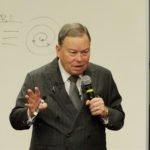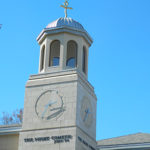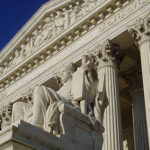Posted: 2/01/08
Prophetic preachers take varied approaches
By Ken Camp & Jim White
Baptist Standard & Religious Herald
ATLANTA—One preacher offered an oblique endorsement of a presidential candidate, and another firmly defended the separation of church and state. One urged Christians to link prophetic imagination to concrete practices, and another cited the specific example of tearing down walls that divide.
The four preachers—two African-American, one Anglo and one Hispanic—participated in a conference on prophetic preaching during the New Baptist Covenant celebration in Atlanta.
Getting banged up prepares one for prophetic preaching, according to Otis Moss, pastor of the Olivet Institutional Baptist Church in Cleveland, Ohio. Taking Romans 5:3 as his text and referring to Clarence Jordan’s Cotton Patch Version, Moss said that getting “banged up” produces Christian character. Character, in turn, creates hope. And one expression of hope finds fulfillment in prophetic preaching.
Using the New Baptist Covenant Celebration’s scriptural theme of Luke 4:18-19, Moss noted that Jesus’ sermon in the synagogue was shorter than his text. Still, it was poignant enough to create a strong reaction. “Prophetic preaching is dangerous,” he emphasized. “It cannot keep you from being killed, but it can keep you from being a killer.”
| • See latest photos and the latest video clips from the New Baptist Covenant Meeting. (And go here to see our complete coverage of the event). |
Alluding to a tree made strong by the storms it encounters, he said, “When I struggle, I become strong.” He illustrated the point from Martin Luther King Jr.’s sermon at Riverside Church in New York the year before he was assassinated. In referring to his own struggle in deciding to condemn the Vietnam War, King called the ministry “a vocation of agony.”
Encouraging those who would preach prophetically to be true to their conscience, Moss challenged them to preach not based on what is popular or expedient or safe, but on what is right. “Conscience asks, ‘Is it right?’”
Preaching prophetically presupposes an assignment of suffering, service and sacrifice, he added. The prophetic preacher attends the “University of Adversity and graduates with a degree that enables you to say ‘I have fought the good fight. I have finished the course.’”
Moss exercised his prophetic prerogative by stopping just short of publicly endorsing a candidate for President. He said he would not use the platform of the conference to tell anyone whom he would vote for, but he would be glad to do it on Saturday, after the three-day Baptist meeting ended.
And, he added, when he did it, he would tell “his name and what city he’s from in the Midwest”—an apparent reference to Sen. Barack Obama.
On the other hand, Bill Self, senior pastor of Johns Creek Baptist Church in Atlanta, said, “I declared my church a politics-free zone.”
He emphasized his unwillingness to hook his church to any political wagon.
“My wagon is hooked to the cross of Jesus Christ,” he stressed.
As a pastor, Self stressed his responsibility to his flock. And he said part of that responsibility entails making sure the members are not “fleeced by Rome” or “fleeced by Pharaoh.”
Gina Stewart, senior pastor of Christ Missionary Baptist Church in Memphis, Tenn., challenged preachers to exercise “prophetic imagination” like the Old Testament prophets and like what Martin Luther King Jr. demonstrated in the “I have a Dream” speech.
“Prophetic imagination leads to concrete practice,” she said.
She noted the challenge of reconciling the tension between the counter-cultural vision of the dream and a crushing reality that often becomes a nightmare.
“We are a bundle of contradictions,” she said, noting that our lives resemble Isaiah’s vision of a lion and a lamb, but they are not lying down together. “We must recognize both the predator and the prey that is inside each of us.”
Christ came to tear down walls that divide people, South Texas pastor Ellis Orozco said. So, can Christians find any real security in a fence built along an “imaginary line” to separate two nations?
“Jesus didn’t come to build walls. He didn’t come to build fences. He came to tear them down,” said the pastor of Calvary Baptist Church in McAllen.
“I live on the border,” Orozco said. “But then again, who doesn’t live on the border these days? The border keeps moving. We don’t cross the border anymore. The border crosses us.”
While they speak of a fence as a way of securing the nation’s borders, the unspoken reason many people support the building of a barrier along the United States’ southern border is because they fear “the browning of America,” he said.
For generations of poor males in Mexico, answering “the call to head north” to help support their families has become a rite of passage, Orozco said. Desperation drives them across the border, he insisted.
“We always call 1-800-MEXICO when we need more poor people to do work we don’t want to do,” he said. “Who do you think is rebuilding New Orleans? For that matter, who do you think is going to build the fence?”
The Spirit of Christ compels Christians to look at the immigration situation differently, Orozco insisted.
“Jesus comes to us in the eyes of the stranger,” he said.
Walls and fences alienate and separate people, dividing them into “us and them, in and out,” he said. But Jesus alone possesses power to do the impossible and “make the two one,” Orozco said.
Undocumented Mexican immigrants “are not the enemy who have come to take from us,” he insisted. “They are the neighbor who has come to help and to be helped.”
Some may quote an American poet Robert Frost, who said, “Good fences make good neighbors.” Orozco offered a rejoinder to that assertion: “I know Jesus Christ. Jesus Christ is a good friend of mine. And Robert Frost is no Jesus Christ.”
American treatment of Mexican workers and reaction to immigration from Mexico has caused “a loss of moral authority in the global community,” he asserted. Every nation has the right to secure its borders from attack, but walls do not contribute to peace or promote security, Orozco said.
“As long as there are walls, there will never be peace,” he said.














We seek to connect God’s story and God’s people around the world. To learn more about God’s story, click here.
Send comments and feedback to Eric Black, our editor. For comments to be published, please specify “letter to the editor.” Maximum length for publication is 300 words.